Types of Accommodation Services in the Hospitality Industry
VerifiedAdded on 2022/12/28
|14
|1573
|64
Presentation
AI Summary
This presentation provides an overview of the types of accommodation services available in the hospitality industry. It discusses the contribution of accommodation services, the difference between commercial and non-commercial businesses, various forms of ownership, grading and classification systems, and the role of online review sites. The presentation aims to enhance understanding of the accommodation sector within the broader hospitality industry.
Contribute Materials
Your contribution can guide someone’s learning journey. Share your
documents today.

MANAGING
ACCOMODATION
SERVICES
LO 1: Types of accommodation services available within the
hospitality industry
ACCOMODATION
SERVICES
LO 1: Types of accommodation services available within the
hospitality industry
Secure Best Marks with AI Grader
Need help grading? Try our AI Grader for instant feedback on your assignments.
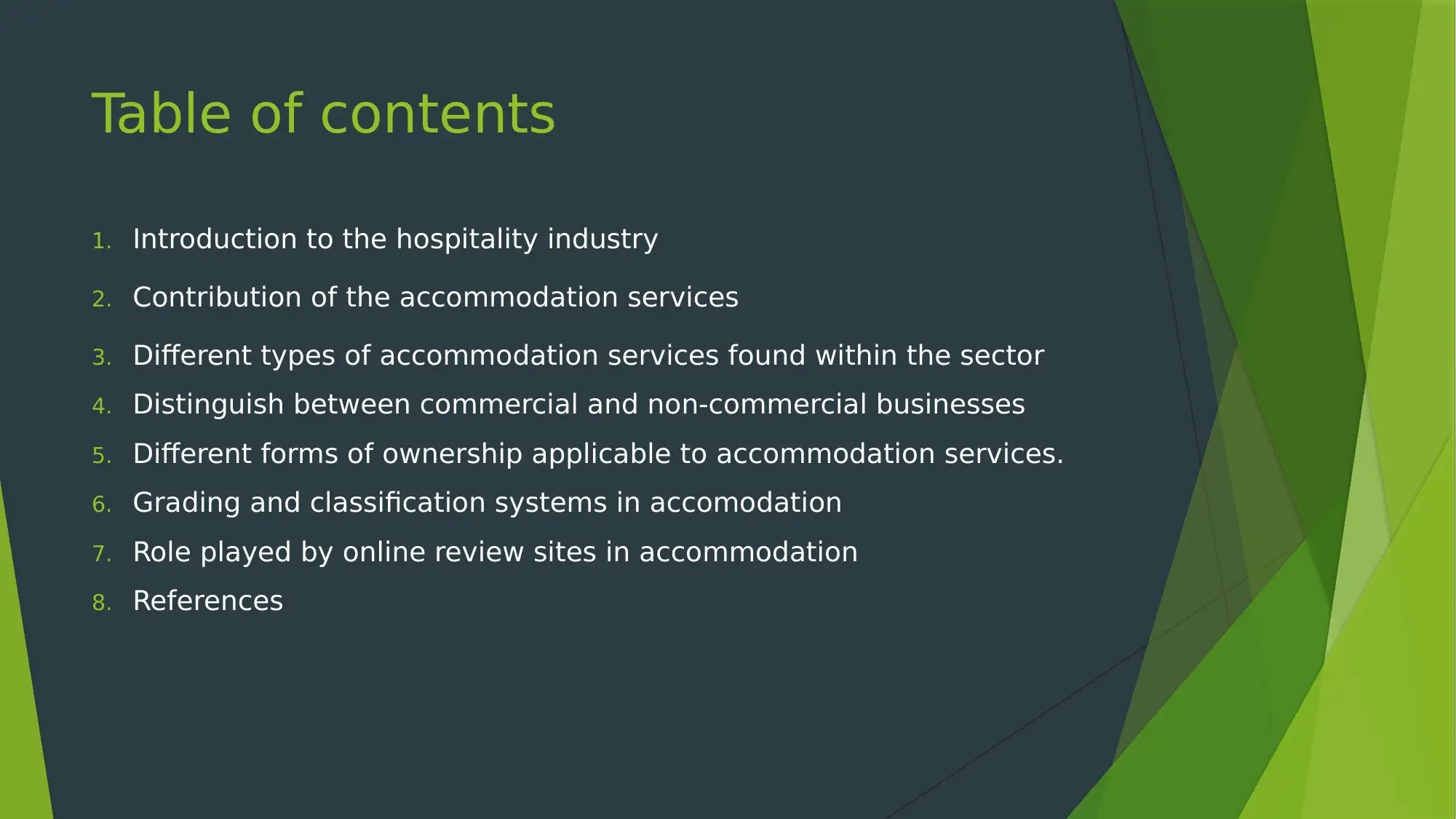
Table of contents
1. Introduction to the hospitality industry
2. Contribution of the accommodation services
3. Different types of accommodation services found within the sector
4. Distinguish between commercial and non-commercial businesses
5. Different forms of ownership applicable to accommodation services.
6. Grading and classification systems in accomodation
7. Role played by online review sites in accommodation
8. References
1. Introduction to the hospitality industry
2. Contribution of the accommodation services
3. Different types of accommodation services found within the sector
4. Distinguish between commercial and non-commercial businesses
5. Different forms of ownership applicable to accommodation services.
6. Grading and classification systems in accomodation
7. Role played by online review sites in accommodation
8. References
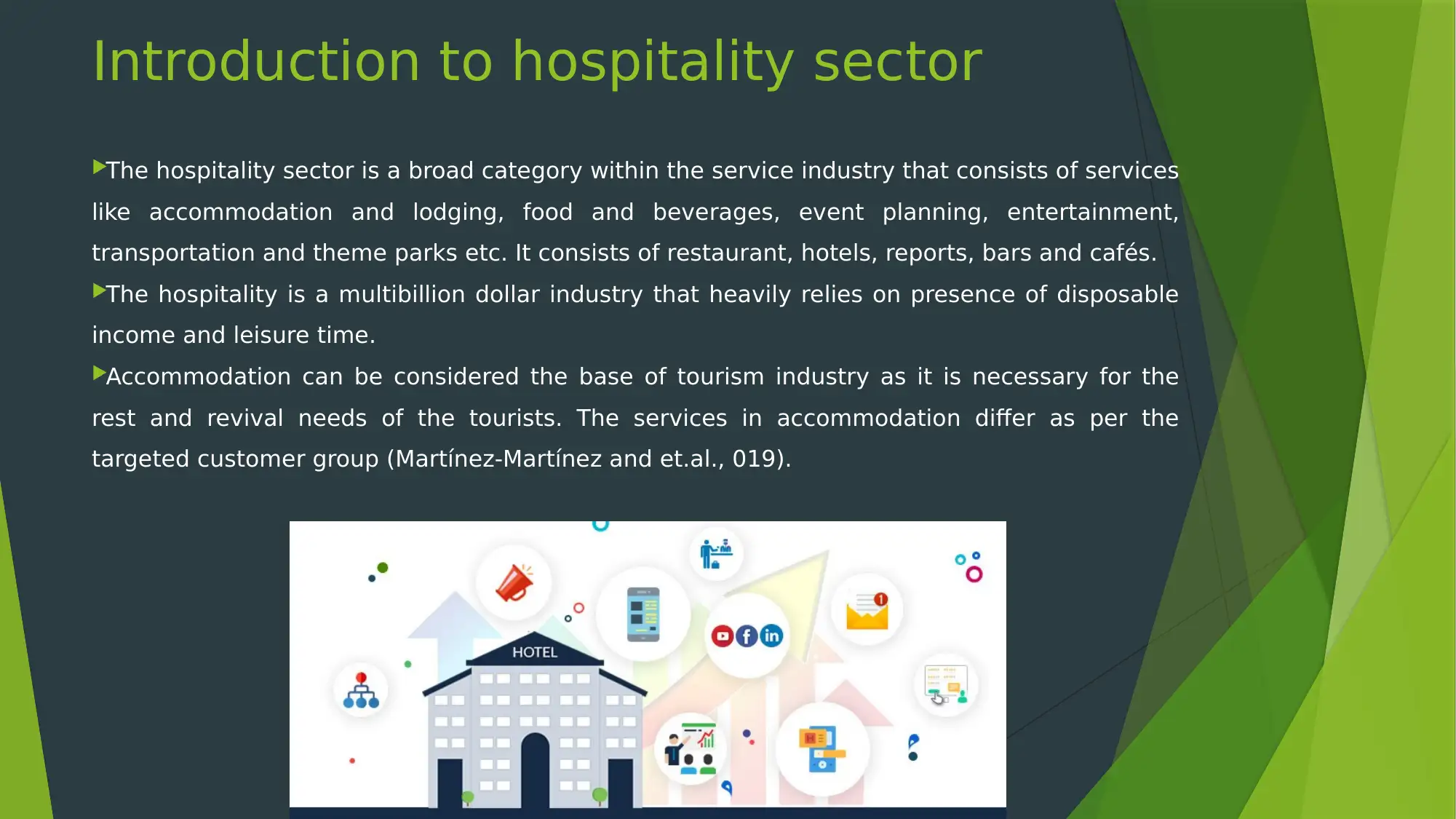
Introduction to hospitality sector
The hospitality sector is a broad category within the service industry that consists of services
like accommodation and lodging, food and beverages, event planning, entertainment,
transportation and theme parks etc. It consists of restaurant, hotels, reports, bars and cafés.
The hospitality is a multibillion dollar industry that heavily relies on presence of disposable
income and leisure time.
Accommodation can be considered the base of tourism industry as it is necessary for the
rest and revival needs of the tourists. The services in accommodation differ as per the
targeted customer group (Martínez-Martínez and et.al., 019).
The hospitality sector is a broad category within the service industry that consists of services
like accommodation and lodging, food and beverages, event planning, entertainment,
transportation and theme parks etc. It consists of restaurant, hotels, reports, bars and cafés.
The hospitality is a multibillion dollar industry that heavily relies on presence of disposable
income and leisure time.
Accommodation can be considered the base of tourism industry as it is necessary for the
rest and revival needs of the tourists. The services in accommodation differ as per the
targeted customer group (Martínez-Martínez and et.al., 019).
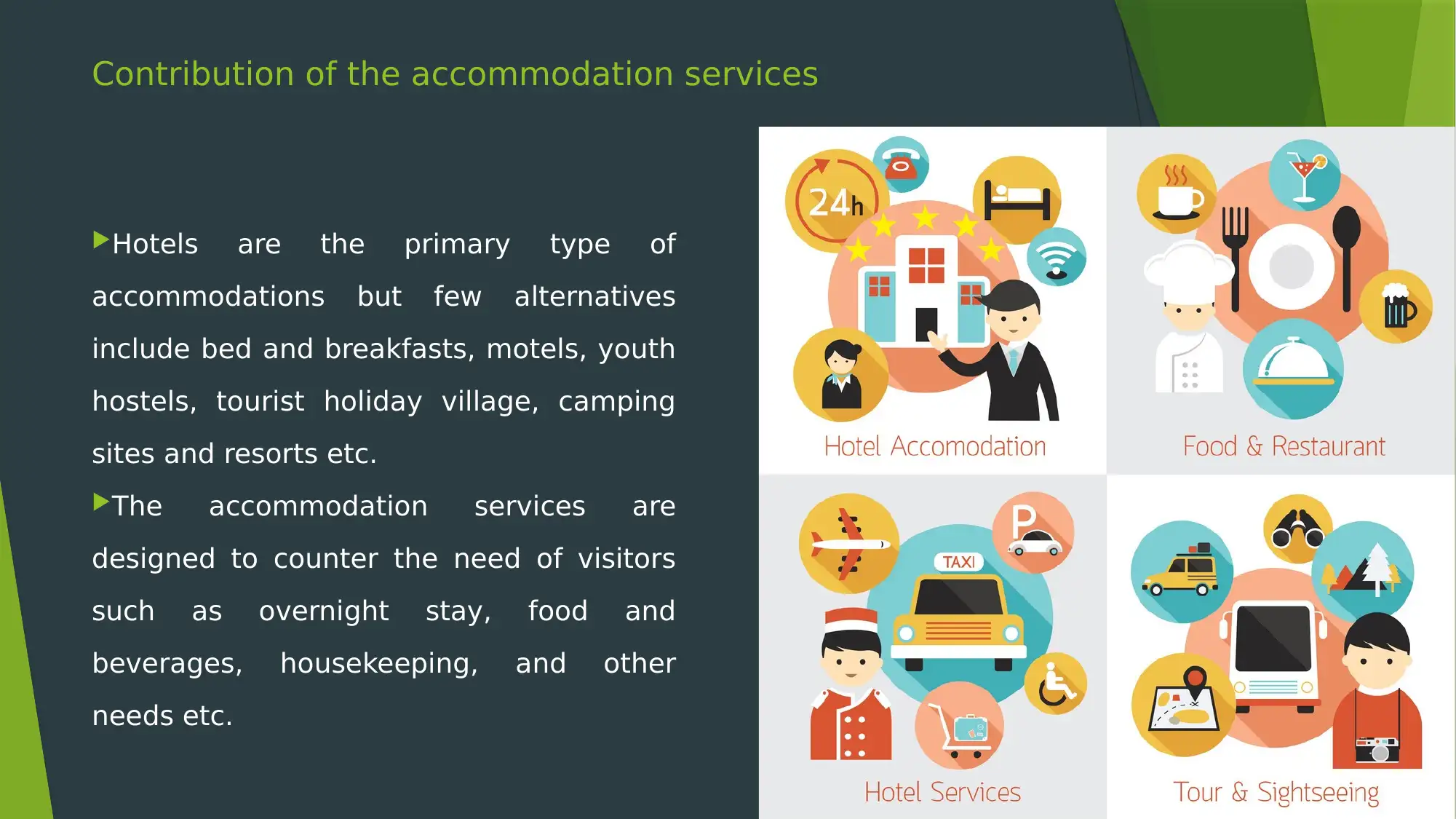
Contribution of the accommodation services
Hotels are the primary type of
accommodations but few alternatives
include bed and breakfasts, motels, youth
hostels, tourist holiday village, camping
sites and resorts etc.
The accommodation services are
designed to counter the need of visitors
such as overnight stay, food and
beverages, housekeeping, and other
needs etc.
Hotels are the primary type of
accommodations but few alternatives
include bed and breakfasts, motels, youth
hostels, tourist holiday village, camping
sites and resorts etc.
The accommodation services are
designed to counter the need of visitors
such as overnight stay, food and
beverages, housekeeping, and other
needs etc.
Secure Best Marks with AI Grader
Need help grading? Try our AI Grader for instant feedback on your assignments.
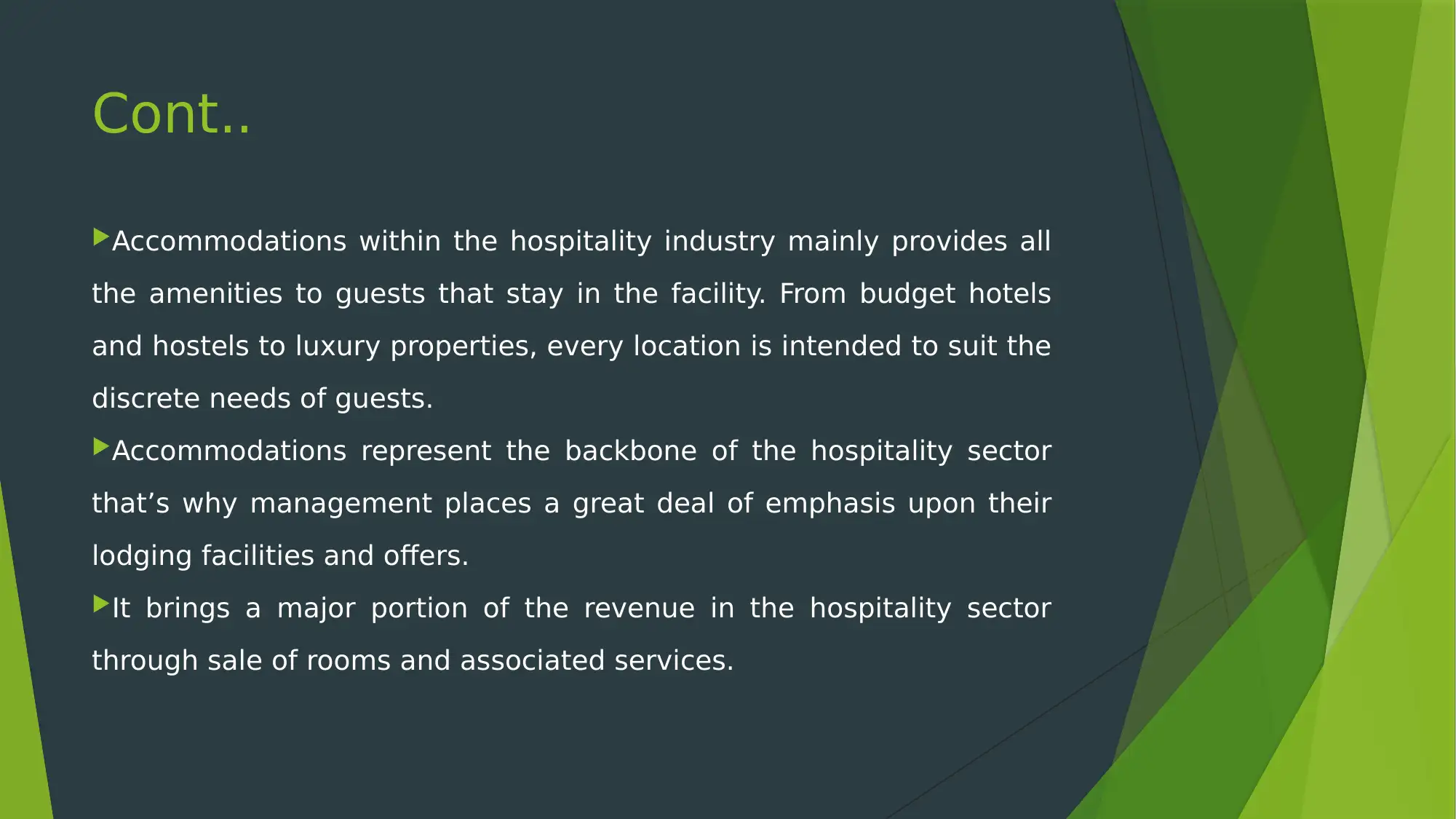
Cont..
Accommodations within the hospitality industry mainly provides all
the amenities to guests that stay in the facility. From budget hotels
and hostels to luxury properties, every location is intended to suit the
discrete needs of guests.
Accommodations represent the backbone of the hospitality sector
that’s why management places a great deal of emphasis upon their
lodging facilities and offers.
It brings a major portion of the revenue in the hospitality sector
through sale of rooms and associated services.
Accommodations within the hospitality industry mainly provides all
the amenities to guests that stay in the facility. From budget hotels
and hostels to luxury properties, every location is intended to suit the
discrete needs of guests.
Accommodations represent the backbone of the hospitality sector
that’s why management places a great deal of emphasis upon their
lodging facilities and offers.
It brings a major portion of the revenue in the hospitality sector
through sale of rooms and associated services.
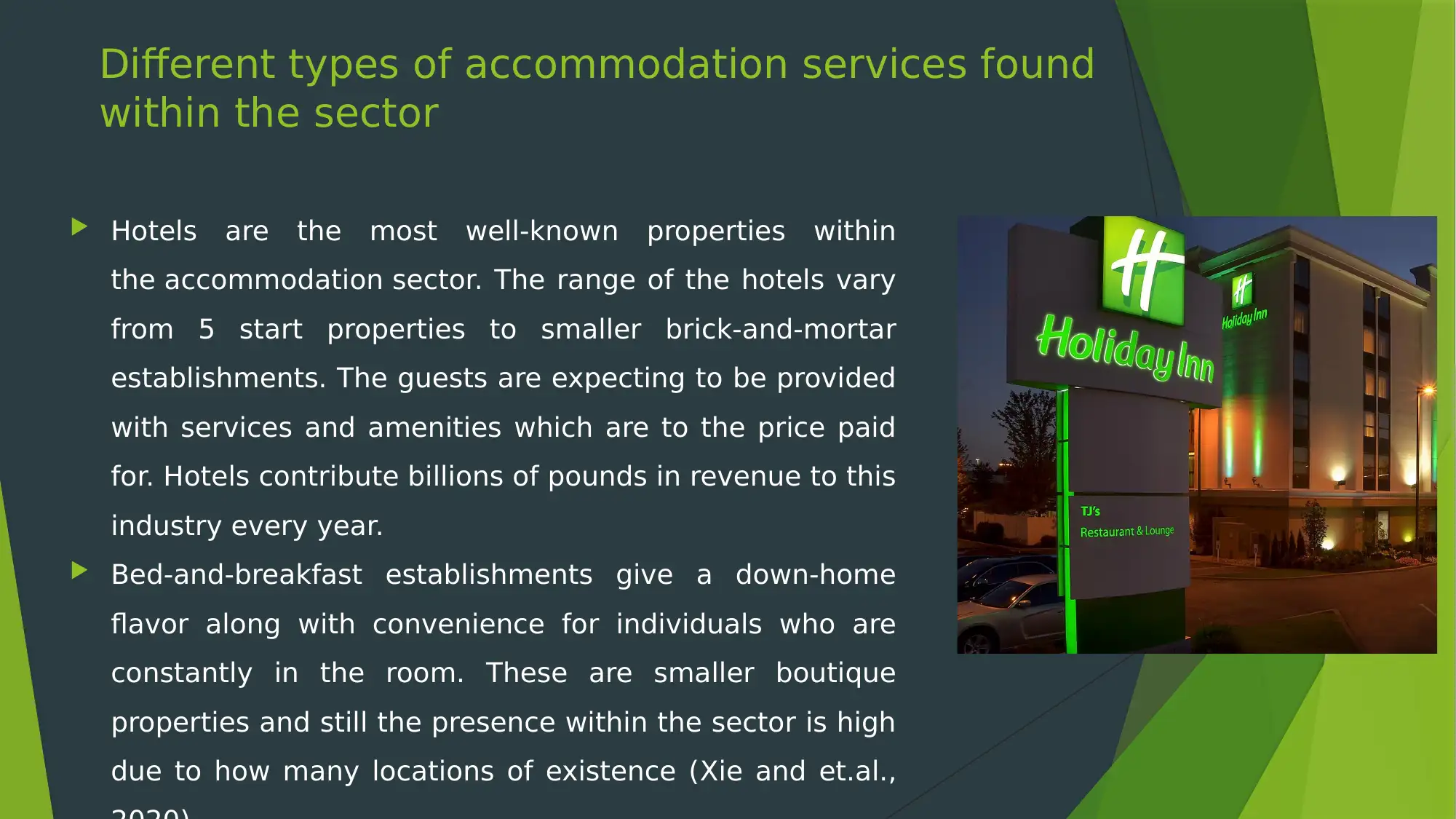
Different types of accommodation services found
within the sector
Hotels are the most well-known properties within
the accommodation sector. The range of the hotels vary
from 5 start properties to smaller brick-and-mortar
establishments. The guests are expecting to be provided
with services and amenities which are to the price paid
for. Hotels contribute billions of pounds in revenue to this
industry every year.
Bed-and-breakfast establishments give a down-home
flavor along with convenience for individuals who are
constantly in the room. These are smaller boutique
properties and still the presence within the sector is high
due to how many locations of existence (Xie and et.al.,
within the sector
Hotels are the most well-known properties within
the accommodation sector. The range of the hotels vary
from 5 start properties to smaller brick-and-mortar
establishments. The guests are expecting to be provided
with services and amenities which are to the price paid
for. Hotels contribute billions of pounds in revenue to this
industry every year.
Bed-and-breakfast establishments give a down-home
flavor along with convenience for individuals who are
constantly in the room. These are smaller boutique
properties and still the presence within the sector is high
due to how many locations of existence (Xie and et.al.,
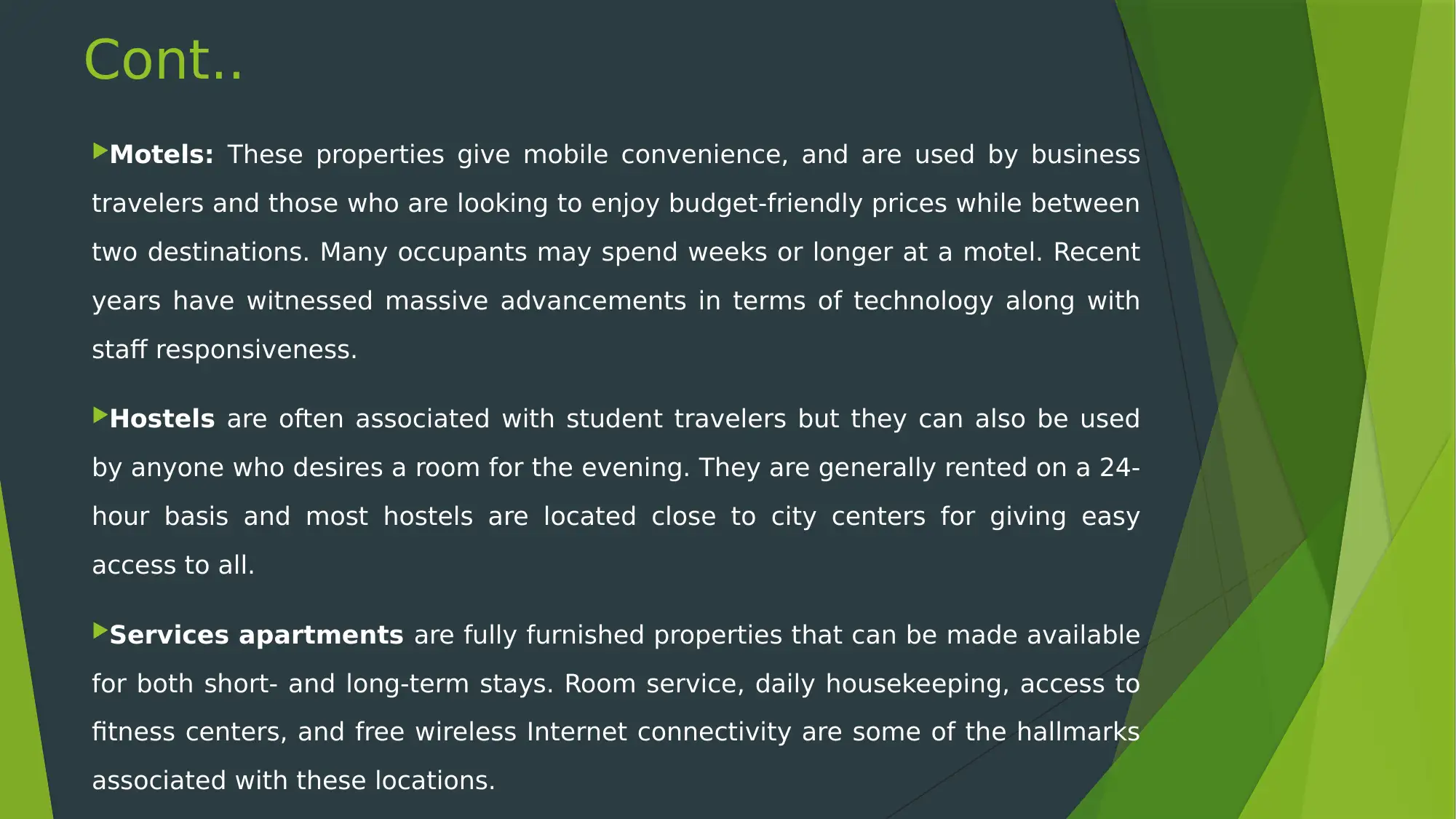
Cont..
Motels: These properties give mobile convenience, and are used by business
travelers and those who are looking to enjoy budget-friendly prices while between
two destinations. Many occupants may spend weeks or longer at a motel. Recent
years have witnessed massive advancements in terms of technology along with
staff responsiveness.
Hostels are often associated with student travelers but they can also be used
by anyone who desires a room for the evening. They are generally rented on a 24-
hour basis and most hostels are located close to city centers for giving easy
access to all.
Services apartments are fully furnished properties that can be made available
for both short- and long-term stays. Room service, daily housekeeping, access to
fitness centers, and free wireless Internet connectivity are some of the hallmarks
associated with these locations.
Motels: These properties give mobile convenience, and are used by business
travelers and those who are looking to enjoy budget-friendly prices while between
two destinations. Many occupants may spend weeks or longer at a motel. Recent
years have witnessed massive advancements in terms of technology along with
staff responsiveness.
Hostels are often associated with student travelers but they can also be used
by anyone who desires a room for the evening. They are generally rented on a 24-
hour basis and most hostels are located close to city centers for giving easy
access to all.
Services apartments are fully furnished properties that can be made available
for both short- and long-term stays. Room service, daily housekeeping, access to
fitness centers, and free wireless Internet connectivity are some of the hallmarks
associated with these locations.
Paraphrase This Document
Need a fresh take? Get an instant paraphrase of this document with our AI Paraphraser
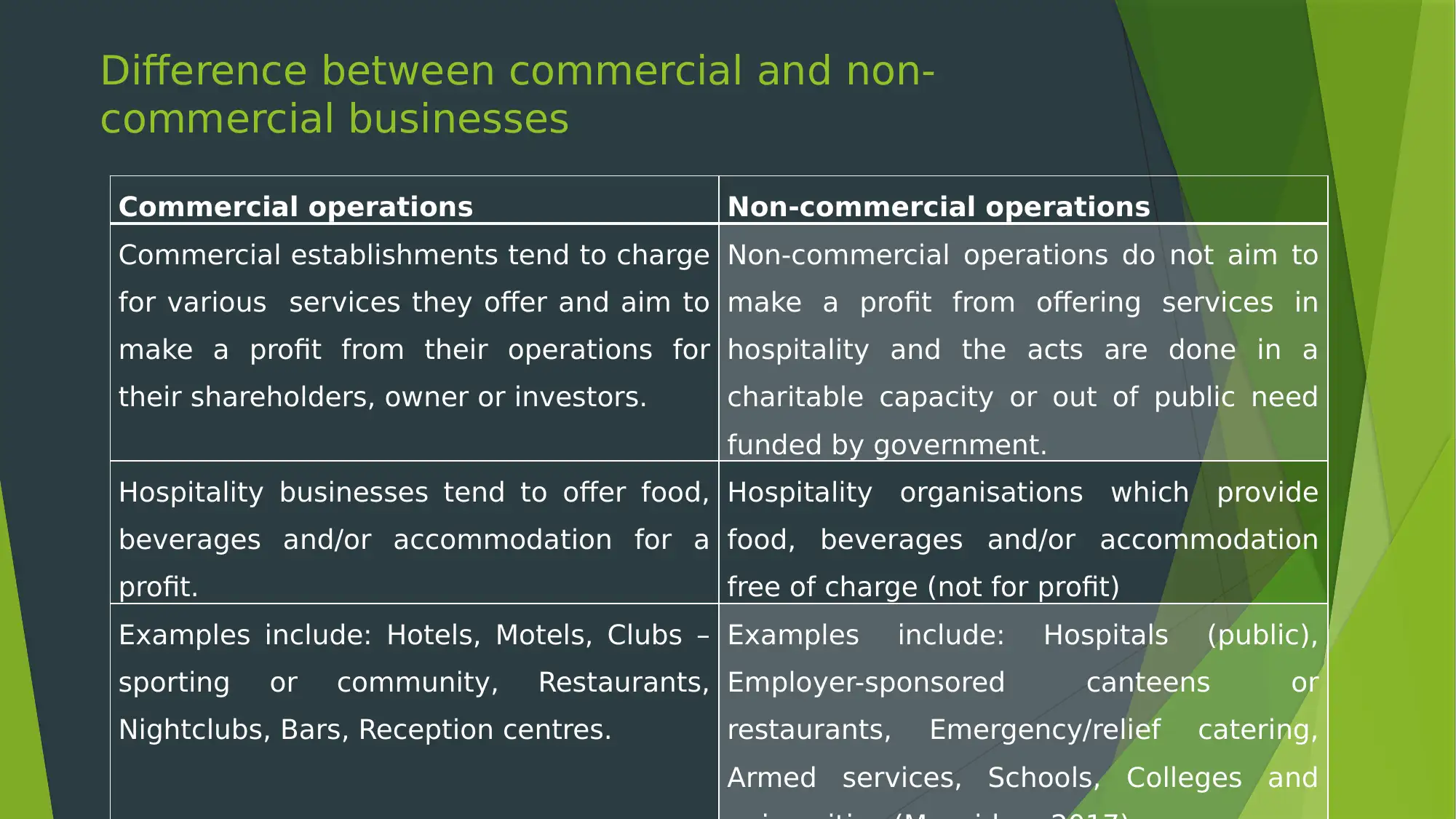
Difference between commercial and non-
commercial businesses
Commercial operations Non-commercial operations
Commercial establishments tend to charge
for various services they offer and aim to
make a profit from their operations for
their shareholders, owner or investors.
Non-commercial operations do not aim to
make a profit from offering services in
hospitality and the acts are done in a
charitable capacity or out of public need
funded by government.
Hospitality businesses tend to offer food,
beverages and/or accommodation for a
profit.
Hospitality organisations which provide
food, beverages and/or accommodation
free of charge (not for profit)
Examples include: Hotels, Motels, Clubs –
sporting or community, Restaurants,
Nightclubs, Bars, Reception centres.
Examples include: Hospitals (public),
Employer-sponsored canteens or
restaurants, Emergency/relief catering,
Armed services, Schools, Colleges and
commercial businesses
Commercial operations Non-commercial operations
Commercial establishments tend to charge
for various services they offer and aim to
make a profit from their operations for
their shareholders, owner or investors.
Non-commercial operations do not aim to
make a profit from offering services in
hospitality and the acts are done in a
charitable capacity or out of public need
funded by government.
Hospitality businesses tend to offer food,
beverages and/or accommodation for a
profit.
Hospitality organisations which provide
food, beverages and/or accommodation
free of charge (not for profit)
Examples include: Hotels, Motels, Clubs –
sporting or community, Restaurants,
Nightclubs, Bars, Reception centres.
Examples include: Hospitals (public),
Employer-sponsored canteens or
restaurants, Emergency/relief catering,
Armed services, Schools, Colleges and
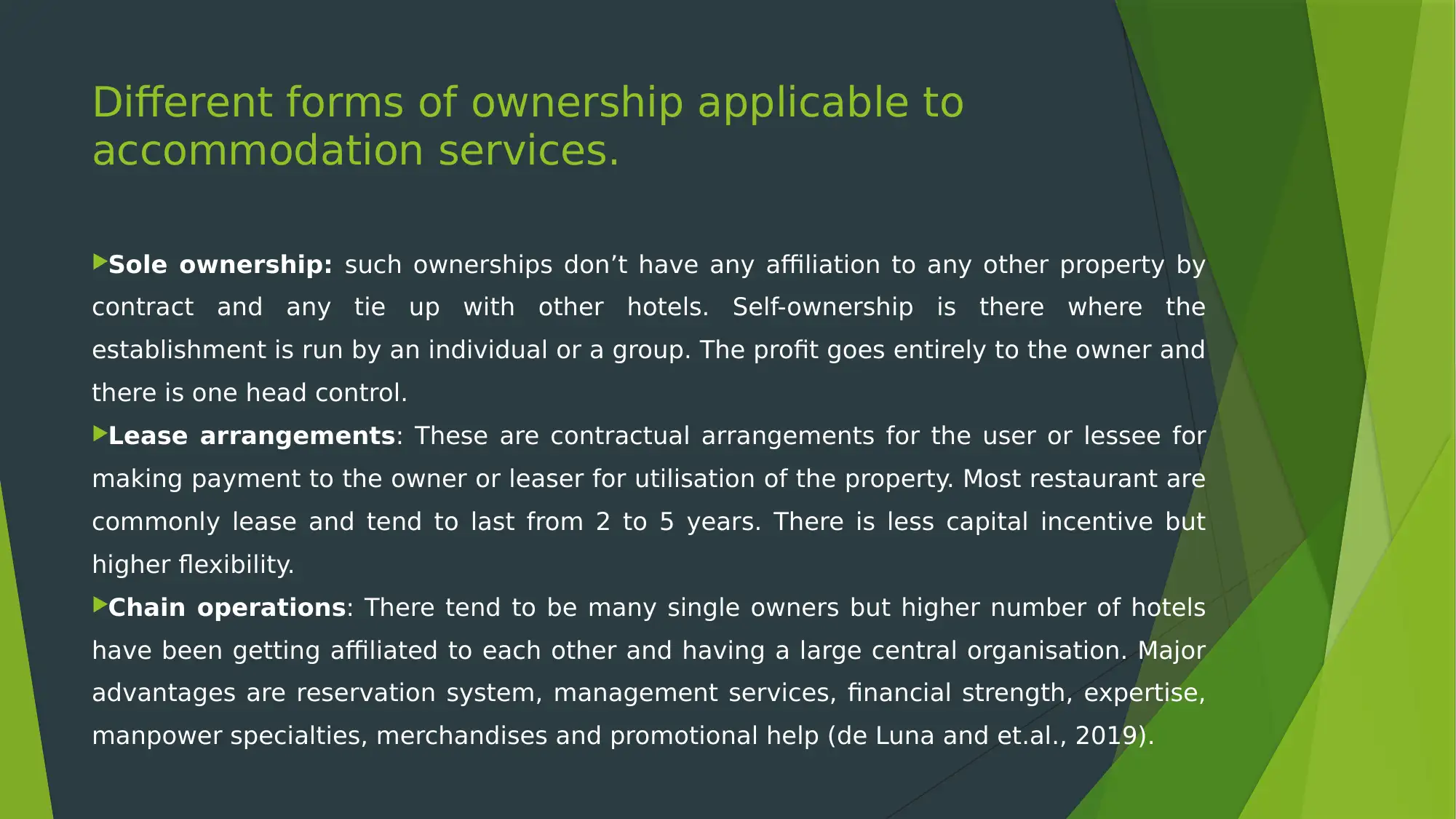
Different forms of ownership applicable to
accommodation services.
Sole ownership: such ownerships don’t have any affiliation to any other property by
contract and any tie up with other hotels. Self-ownership is there where the
establishment is run by an individual or a group. The profit goes entirely to the owner and
there is one head control.
Lease arrangements: These are contractual arrangements for the user or lessee for
making payment to the owner or leaser for utilisation of the property. Most restaurant are
commonly lease and tend to last from 2 to 5 years. There is less capital incentive but
higher flexibility.
Chain operations: There tend to be many single owners but higher number of hotels
have been getting affiliated to each other and having a large central organisation. Major
advantages are reservation system, management services, financial strength, expertise,
manpower specialties, merchandises and promotional help (de Luna and et.al., 2019).
accommodation services.
Sole ownership: such ownerships don’t have any affiliation to any other property by
contract and any tie up with other hotels. Self-ownership is there where the
establishment is run by an individual or a group. The profit goes entirely to the owner and
there is one head control.
Lease arrangements: These are contractual arrangements for the user or lessee for
making payment to the owner or leaser for utilisation of the property. Most restaurant are
commonly lease and tend to last from 2 to 5 years. There is less capital incentive but
higher flexibility.
Chain operations: There tend to be many single owners but higher number of hotels
have been getting affiliated to each other and having a large central organisation. Major
advantages are reservation system, management services, financial strength, expertise,
manpower specialties, merchandises and promotional help (de Luna and et.al., 2019).
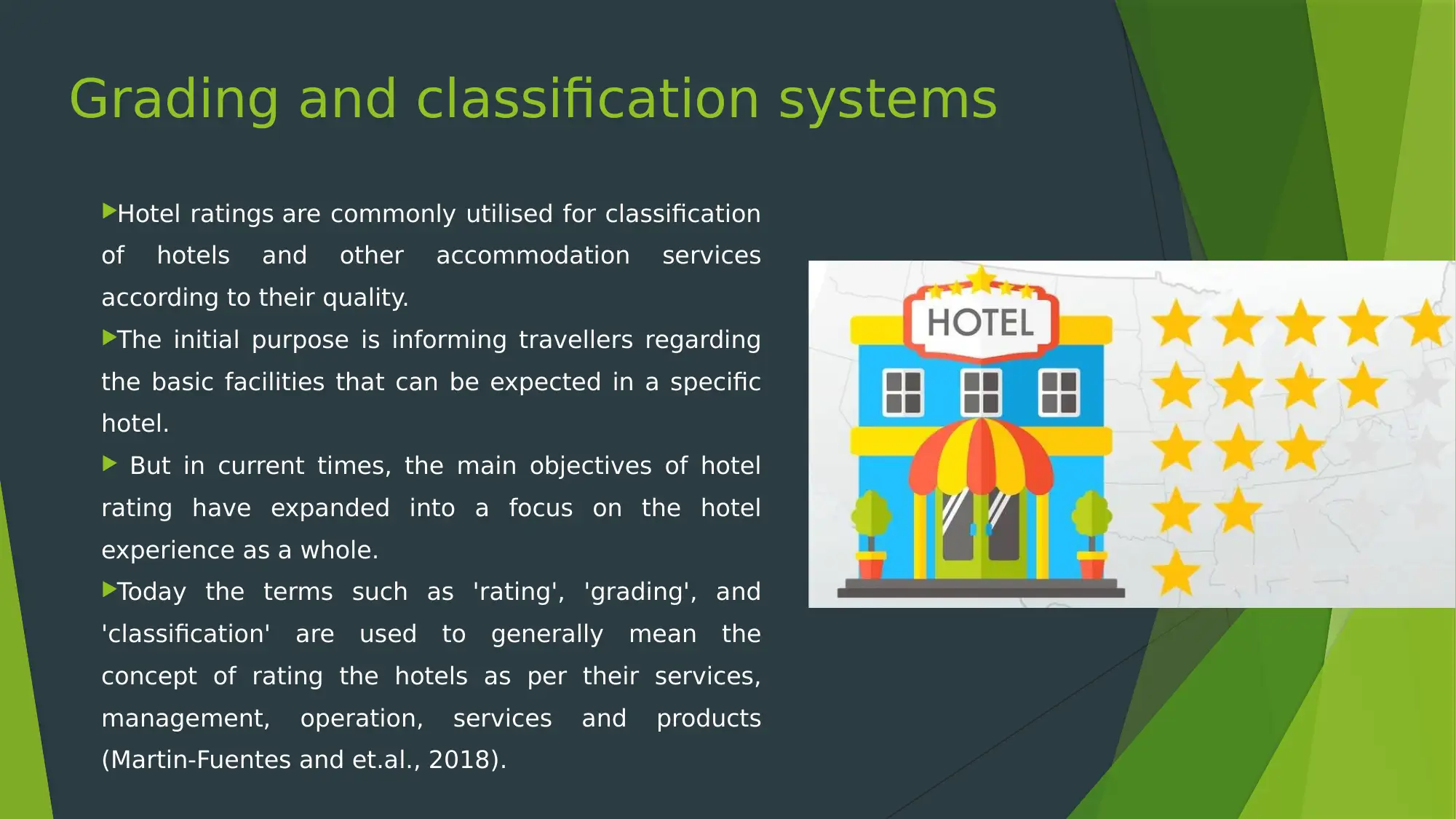
Grading and classification systems
Hotel ratings are commonly utilised for classification
of hotels and other accommodation services
according to their quality.
The initial purpose is informing travellers regarding
the basic facilities that can be expected in a specific
hotel.
But in current times, the main objectives of hotel
rating have expanded into a focus on the hotel
experience as a whole.
Today the terms such as 'rating', 'grading', and
'classification' are used to generally mean the
concept of rating the hotels as per their services,
management, operation, services and products
(Martin-Fuentes and et.al., 2018).
Hotel ratings are commonly utilised for classification
of hotels and other accommodation services
according to their quality.
The initial purpose is informing travellers regarding
the basic facilities that can be expected in a specific
hotel.
But in current times, the main objectives of hotel
rating have expanded into a focus on the hotel
experience as a whole.
Today the terms such as 'rating', 'grading', and
'classification' are used to generally mean the
concept of rating the hotels as per their services,
management, operation, services and products
(Martin-Fuentes and et.al., 2018).
Secure Best Marks with AI Grader
Need help grading? Try our AI Grader for instant feedback on your assignments.
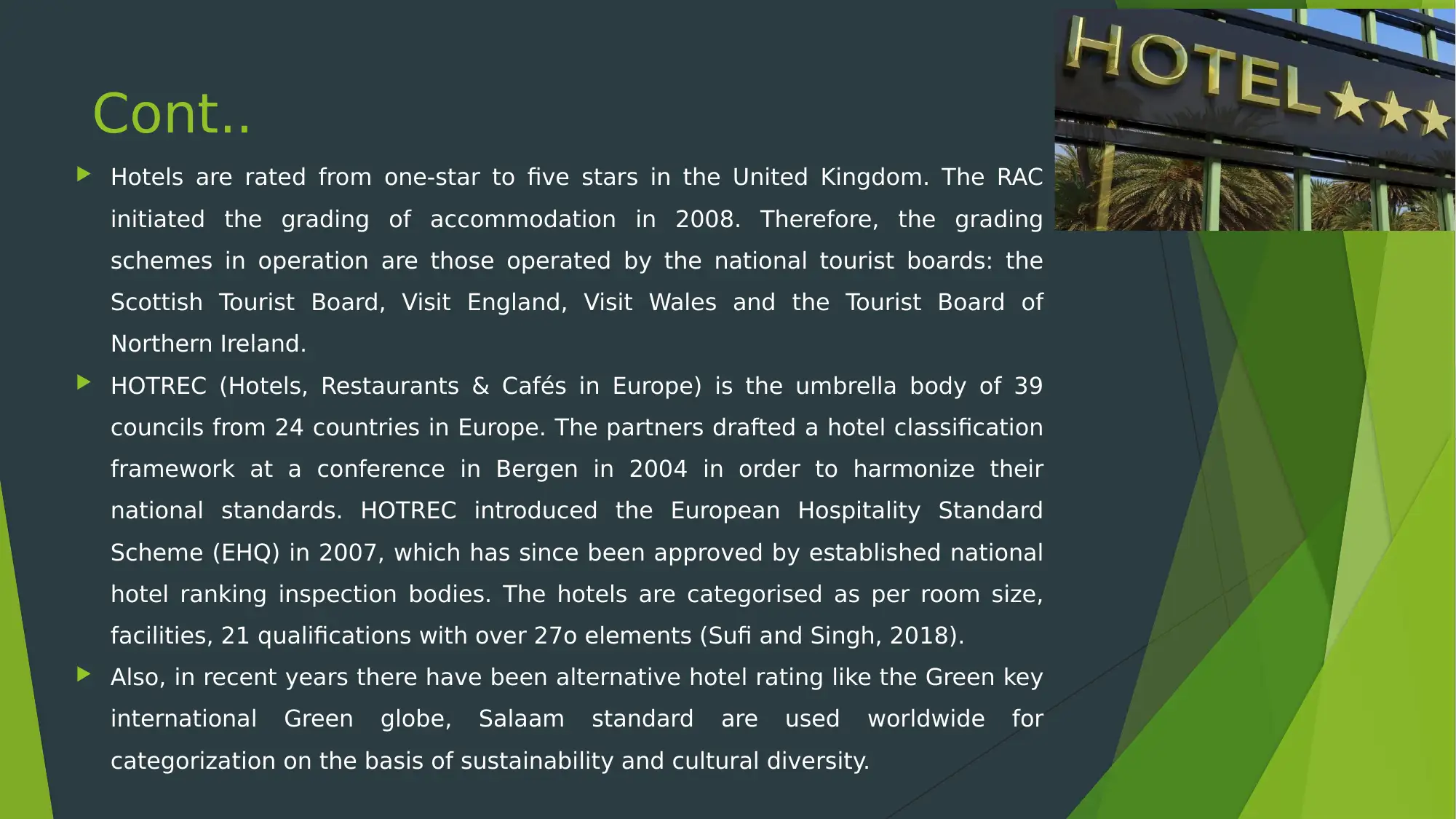
Cont..
Hotels are rated from one-star to five stars in the United Kingdom. The RAC
initiated the grading of accommodation in 2008. Therefore, the grading
schemes in operation are those operated by the national tourist boards: the
Scottish Tourist Board, Visit England, Visit Wales and the Tourist Board of
Northern Ireland.
HOTREC (Hotels, Restaurants & Cafés in Europe) is the umbrella body of 39
councils from 24 countries in Europe. The partners drafted a hotel classification
framework at a conference in Bergen in 2004 in order to harmonize their
national standards. HOTREC introduced the European Hospitality Standard
Scheme (EHQ) in 2007, which has since been approved by established national
hotel ranking inspection bodies. The hotels are categorised as per room size,
facilities, 21 qualifications with over 27o elements (Sufi and Singh, 2018).
Also, in recent years there have been alternative hotel rating like the Green key
international Green globe, Salaam standard are used worldwide for
categorization on the basis of sustainability and cultural diversity.
Hotels are rated from one-star to five stars in the United Kingdom. The RAC
initiated the grading of accommodation in 2008. Therefore, the grading
schemes in operation are those operated by the national tourist boards: the
Scottish Tourist Board, Visit England, Visit Wales and the Tourist Board of
Northern Ireland.
HOTREC (Hotels, Restaurants & Cafés in Europe) is the umbrella body of 39
councils from 24 countries in Europe. The partners drafted a hotel classification
framework at a conference in Bergen in 2004 in order to harmonize their
national standards. HOTREC introduced the European Hospitality Standard
Scheme (EHQ) in 2007, which has since been approved by established national
hotel ranking inspection bodies. The hotels are categorised as per room size,
facilities, 21 qualifications with over 27o elements (Sufi and Singh, 2018).
Also, in recent years there have been alternative hotel rating like the Green key
international Green globe, Salaam standard are used worldwide for
categorization on the basis of sustainability and cultural diversity.
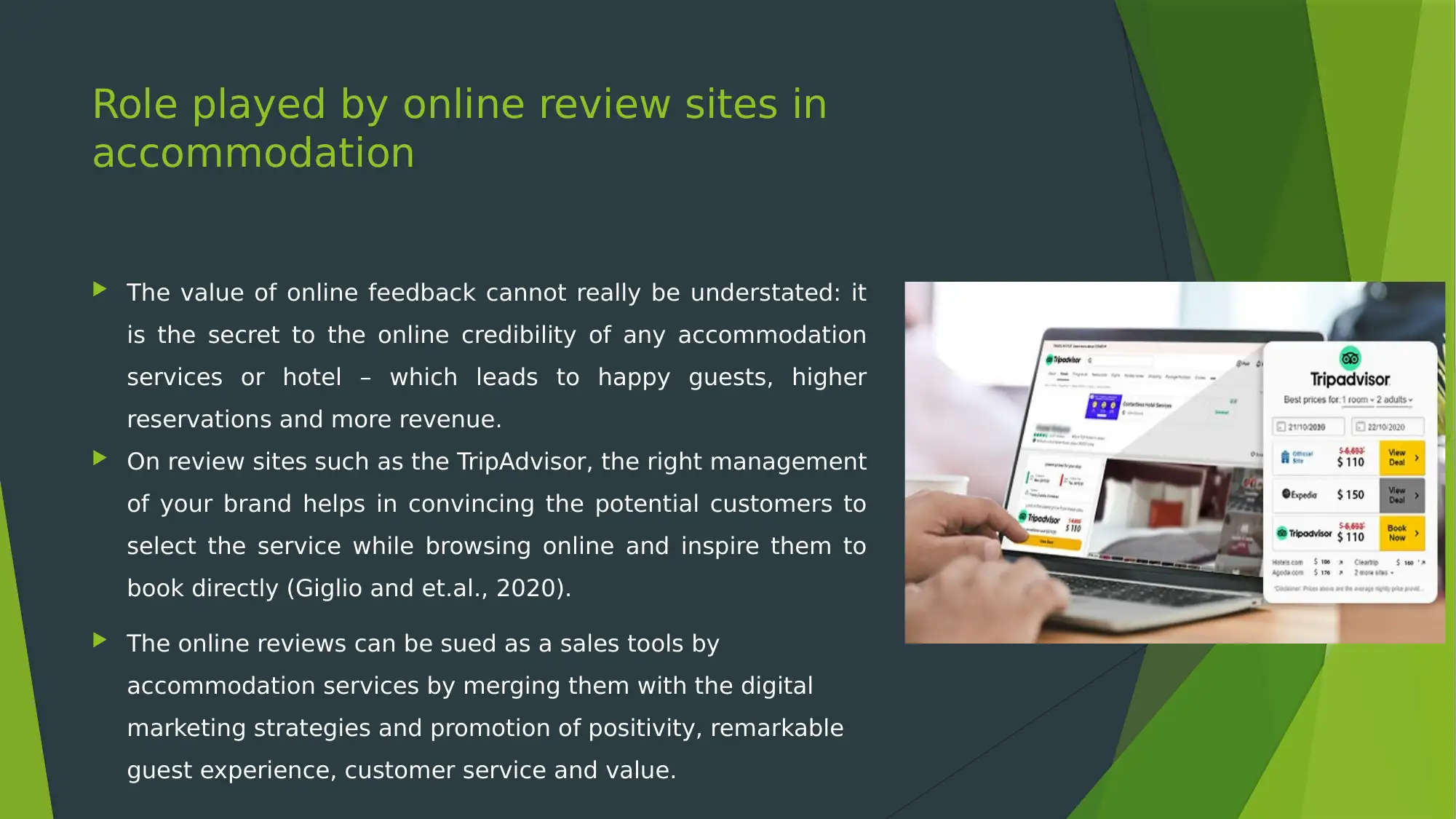
Role played by online review sites in
accommodation
The value of online feedback cannot really be understated: it
is the secret to the online credibility of any accommodation
services or hotel – which leads to happy guests, higher
reservations and more revenue.
On review sites such as the TripAdvisor, the right management
of your brand helps in convincing the potential customers to
select the service while browsing online and inspire them to
book directly (Giglio and et.al., 2020).
The online reviews can be sued as a sales tools by
accommodation services by merging them with the digital
marketing strategies and promotion of positivity, remarkable
guest experience, customer service and value.
accommodation
The value of online feedback cannot really be understated: it
is the secret to the online credibility of any accommodation
services or hotel – which leads to happy guests, higher
reservations and more revenue.
On review sites such as the TripAdvisor, the right management
of your brand helps in convincing the potential customers to
select the service while browsing online and inspire them to
book directly (Giglio and et.al., 2020).
The online reviews can be sued as a sales tools by
accommodation services by merging them with the digital
marketing strategies and promotion of positivity, remarkable
guest experience, customer service and value.
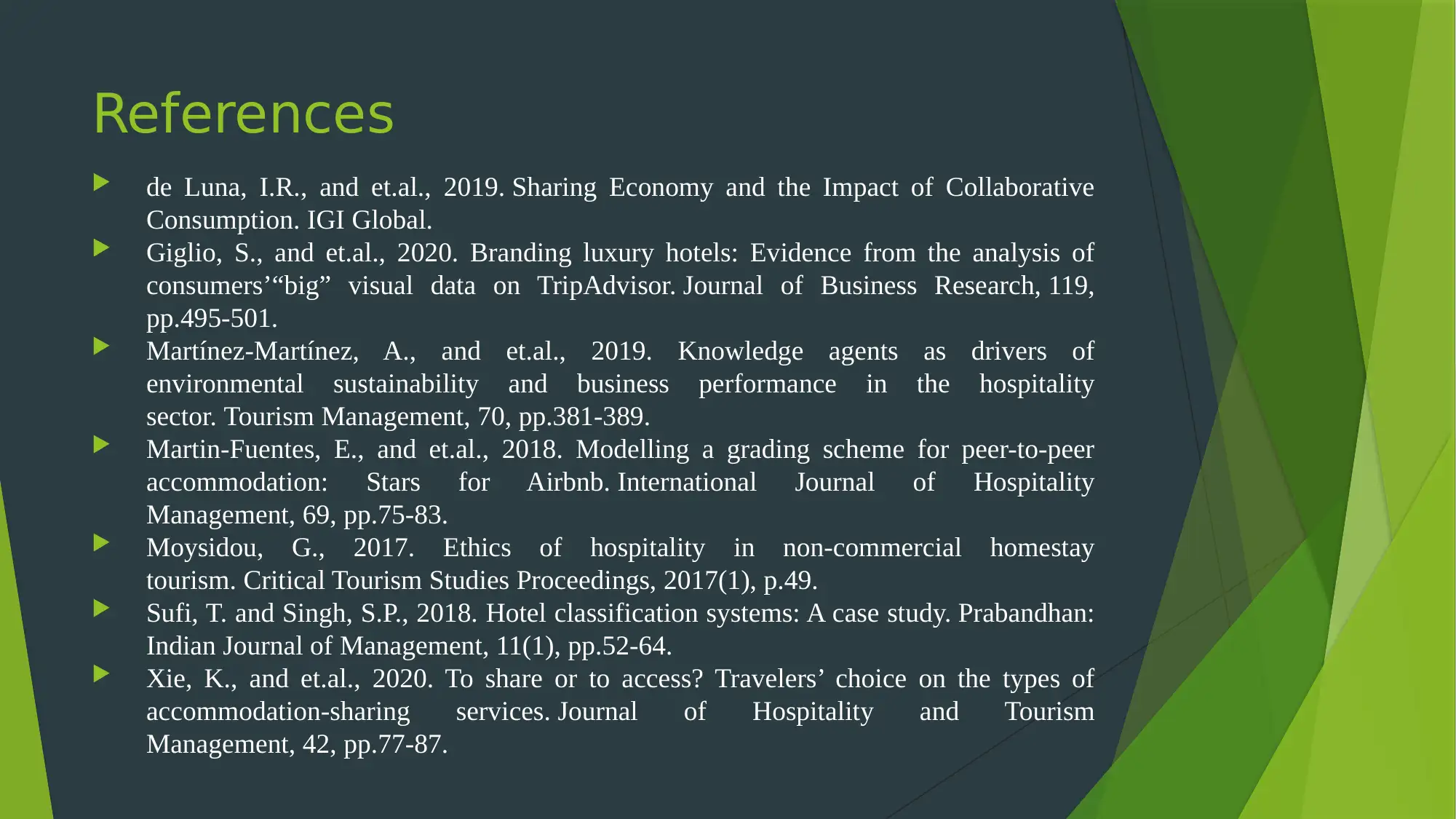
References
de Luna, I.R., and et.al., 2019. Sharing Economy and the Impact of Collaborative
Consumption. IGI Global.
Giglio, S., and et.al., 2020. Branding luxury hotels: Evidence from the analysis of
consumers’“big” visual data on TripAdvisor. Journal of Business Research, 119,
pp.495-501.
Martínez-Martínez, A., and et.al., 2019. Knowledge agents as drivers of
environmental sustainability and business performance in the hospitality
sector. Tourism Management, 70, pp.381-389.
Martin-Fuentes, E., and et.al., 2018. Modelling a grading scheme for peer-to-peer
accommodation: Stars for Airbnb. International Journal of Hospitality
Management, 69, pp.75-83.
Moysidou, G., 2017. Ethics of hospitality in non-commercial homestay
tourism. Critical Tourism Studies Proceedings, 2017(1), p.49.
Sufi, T. and Singh, S.P., 2018. Hotel classification systems: A case study. Prabandhan:
Indian Journal of Management, 11(1), pp.52-64.
Xie, K., and et.al., 2020. To share or to access? Travelers’ choice on the types of
accommodation-sharing services. Journal of Hospitality and Tourism
Management, 42, pp.77-87.
de Luna, I.R., and et.al., 2019. Sharing Economy and the Impact of Collaborative
Consumption. IGI Global.
Giglio, S., and et.al., 2020. Branding luxury hotels: Evidence from the analysis of
consumers’“big” visual data on TripAdvisor. Journal of Business Research, 119,
pp.495-501.
Martínez-Martínez, A., and et.al., 2019. Knowledge agents as drivers of
environmental sustainability and business performance in the hospitality
sector. Tourism Management, 70, pp.381-389.
Martin-Fuentes, E., and et.al., 2018. Modelling a grading scheme for peer-to-peer
accommodation: Stars for Airbnb. International Journal of Hospitality
Management, 69, pp.75-83.
Moysidou, G., 2017. Ethics of hospitality in non-commercial homestay
tourism. Critical Tourism Studies Proceedings, 2017(1), p.49.
Sufi, T. and Singh, S.P., 2018. Hotel classification systems: A case study. Prabandhan:
Indian Journal of Management, 11(1), pp.52-64.
Xie, K., and et.al., 2020. To share or to access? Travelers’ choice on the types of
accommodation-sharing services. Journal of Hospitality and Tourism
Management, 42, pp.77-87.
Paraphrase This Document
Need a fresh take? Get an instant paraphrase of this document with our AI Paraphraser

1 out of 14
Related Documents
Your All-in-One AI-Powered Toolkit for Academic Success.
+13062052269
info@desklib.com
Available 24*7 on WhatsApp / Email
![[object Object]](/_next/static/media/star-bottom.7253800d.svg)
Unlock your academic potential
© 2024 | Zucol Services PVT LTD | All rights reserved.





